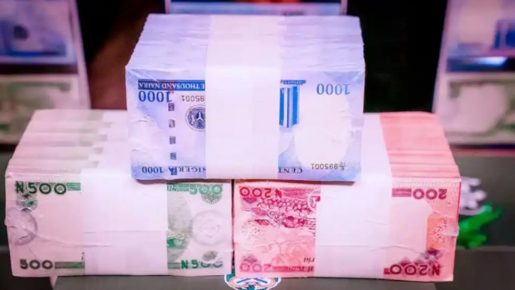In the month of October ( naira), there was a notable 6.2% decrease in the total inflow of foreign currency into the Nigerian Autonomous Foreign Exchange Market (NAFEM). This decrease brought the total inflow down to $1.23 billion from the preceding month’s impressive high of $1.31 billion. However, amid this decline, there were positive indicators for the Nigerian Naira. It continued to exhibit stability against its international counterparts, with an exchange rate of approximately N1000 to a U.S. dollar in the weekend trading sessions. In the key markets of Abuja and Lagos, traders quoted rates of N950 per dollar for buying and N1050 per dollar for selling during the weekend.
These developments have resulted in an overall sentiment that remains positive and robust for the Naira. Some market operators even consider the recent appreciation of the Naira, triggered by the Central Bank of Nigeria’s (CBN) initiation of the settlement of matured foreign exchange (FX) forwards, as the start of a new era for the currency. Analysts are optimistic about the short to medium-term outlook for the local currency, predicting a bullish trajectory. This newfound confidence has kept speculators cautious and, to some extent, at bay.
Further boosting confidence in the Naira, the CBN reportedly began settling outstanding FX commitments, particularly with significant players like CitiBank, Stanbic IBTC, and Standard Chartered Bank, who had overdue forward contracts amounting to $6.7 billion. This move was seen as part of a series of deliberate actions aimed at strengthening the Naira’s value in the coming months, (naira).
Nonetheless, there are skeptics who continue to question the CBN’s capacity to consistently and promptly fulfill its FX obligations, especially in the face of declining supply.
Data sourced from FMDQ Securities Exchange revealed that FX inflows from local investors in the last month saw a 14.6% month-on-month dip, falling to $1.07 billion in October from $1.26 billion in September. This was attributed to significant declines in the CBN’s inflows (a staggering 94.8% decrease) and individuals’ inflows (a staggering 99% decrease).
In contrast, foreign-sourced inflows increased by a notable 182.9% month-on-month, reaching $158.7 million. However, this figure, while showing improvement, still lags significantly behind the pre-pandemic monthly average of $1.28 billion.
In response to these developments, analysts at Codros Capital Market indicated their expectations for FX liquidity conditions to improve moderately, though they acknowledged that they would still be fragile compared to historical levels. They suggested that foreign investors would be closely monitoring developments in the FX market, the CBN’s actions in clearing its FX backlogs, and the direction of short-term interest rates.
Shifting the focus to the Nigerian capital market, listings on the Nigerian Exchange Limited (NGX) exceeded N6 trillion in total value at the close of October. This was primarily due to increased activity in the capital market during the second half of the year.
The NGX Regulation Limited (NGX RegCo) reported that total listings of equity, fixed income, exchange-traded funds, and mutual funds year-to-date, as of the end of October, amounted to N6.23 trillion. A substantial portion of this total was attributed to fixed income listings by the Federal Government of Nigeria, which experienced a remarkable increase in October. These fixed income listings consisted of FGN Bonds, FGN Savings Bonds, and Sukuk bonds, reaching a total value of N6.08 trillion year-to-date.
Furthermore, new equity listings on NGX included VFD Group and Nigeria Infrastructure Debt Fund (NIDF), with market capitalizations of N46.5 billion and N92.54 billion, respectively, in October. These represented the most significant equity listings on NGX in 2023.
The report also highlighted the significant contributions from the Lagos State Government, which remained the only sub-national entity to raise capital on the exchange, with its debt issuances reaching N157.15 billion. Other notable listings included those from Dangote Industries Funding Plc, LFCZ Funding SPV Plc, and other entities.
This impressive performance in the capital market coincided with the equity secondary market’s strong performance. The All-Share Index of NGX surged past the 70,000 mark, achieving a remarkable 36.67% year-to-date increase. Investors, both local and foreign, were closely monitoring market dynamics, especially given the significant shifts in monetary and fiscal policies.
In terms of trading activity, the financial services industry led the way, with the highest trading volume. This was followed by the oil and gas sector and the ICT industry. The top three equities traded were Japual Gold & Ventures Plc, United Bank for Africa Plc, and Fidelity Bank Plc, accounting for a substantial portion of the total equity turnover volume.
Analysts at Codros Capital anticipated that investors would continue to adjust their portfolios towards stocks with strong earnings in the week ahead. They expected bullish sentiment to persist, although profit-taking could limit the magnitude of gains. Nevertheless, investors were advised to seek trading opportunities in fundamentally sound stocks, given the challenges posed by the current macroeconomic environment.
Similarly, Comercio Partners anticipated that market dynamics would continue to follow a similar pattern in the upcoming trading sessions. Positive sentiments were intensified, with investors focusing on stocks influenced by positive FX liquidity and corporate earnings.
Conclusion: Naira
This optimistic sentiment translated into a historic high for the equities market, with the All-Share Index and market capitalization appreciating by 4.56%. At the end of the period, the All-Share Index stood at 70,196.77, and the market capitalization (naira) reached N38.557 trillion.


